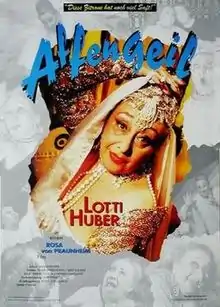Affengeil
Affengeil (German: Affengeil: eine Reise durch Lottis Leben) is a 1990 German documentary film directed by Rosa von Praunheim. The film recounts the eventful life of Lotti Huber, a dancer, actress and cabaret performer, who was the star of the director’s previous films: Anita: Dances of Vice and Our Corpses Are Still Alive. [1]
| Affengeil | |
|---|---|
 Theatrical release poster | |
| Directed by | Rosa von Praunheim |
| Produced by | Rosa von Praunheim |
| Screenplay by | Eva Ebner Lotti Huber Rosa von Praunheim |
| Starring | Lotti Huber Rosa von Praunheim Helga Sloop Gertrud Mischwitky |
| Music by | Marran Gosov Thomas Marquard |
| Cinematography | Klaus Janschewsky Mike Kuchar |
| Edited by | Mike Shephard |
Production company | Exportfilm Bischoff |
| Distributed by | First Run Features |
Release date | 27 October 1990 |
Running time | 87 minutes |
| Country | West Germany |
| Language | German |
The film consists of extended interviews with Huber using photographs, film clips and field trips to recreate her life. The ten year professional relationship between the film director and his subject is explored. Rosa von Praunheim appears arguing about the control of the direction of the film as Huber insists to be portrayed "Just as I am"[1]
Plot
Lotti Huber, in her late seventies at the time of filming, is a short, chubby flamboyant old lady of remarkable vivacity. Appearing wearing large hoop earrings and dramatic makeup, she recounts vividly important events and successes of her life. At the beginning of the film, she demands that Praunheim make a documentary about her.
Huber was born in Kiel in northwestern Germany and grew up in Weimar. Her mother‘s influence resulted in her becoming an independent person who loved studying. At age 16, she fell in love with the son of the mayor of her town. Because she was Jewish and he was Aryan, their relationship was against racial Nazi ideology. Her boyfriend was arrested and shot by the Nazis and she was sent to a concentration camp from which she escaped. She claimed that the details of her escape are so fabulously incredible, that she refrained from telling that story.
After the war, she traveled extensively in Palestine, Egypt, Cyprus and London. By age 27, she was living in Israel, where she developed a successful career as an exotic dancer. She later opened and operated a hotel and restaurant in Cyprus, something unusual for a woman to do during that time and in that place. She did not return to Germany until the 1960s when she established a charm school in Berlin. She later spent several years demonstrating products in a department store. In one scene, she is shown teaching belly-dancing to middle-aged women. She had several marriages and worked as cabaret performer, dancer, restaurateur, teacher, model, movie extra, and finally as an actress who starred in two films directed by Rosa von Praunheim. Their ten year professional relationship is shown as bickering. Praunheim questions the veracity of some of Hubert’s incredible tales and Lotti appears asking the director’s mother about her son’s homosexuality.
Notes
- Murray, Images in the Dark, p. 109
References
- Murray, Raymond. Images in the Dark: An Encyclopedia of Gay and Lesbian Film and Video Guide. TLA Publications, 1994, ISBN 1880707012